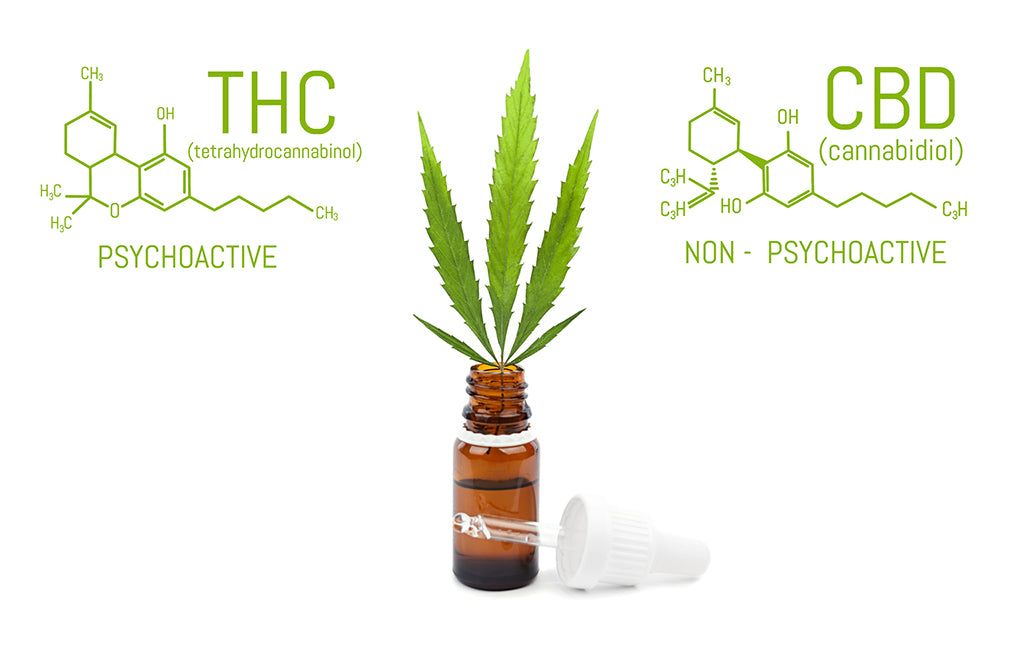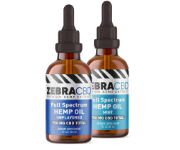
You’ve probably heard the buzz around CBD, the plant-based ingredient that’s behind a booming $340 billion industry. These days, the organic compound drawn from marijuana and hemp plants is ubiquitous — being carried in everything from pharmacies to bodegas and beyond. There are good reasons for its popularity too — namely its many beneficial effects for overall health and wellness.
But you still might find yourself wondering, what does CBD mean when picking up a CBD product.? If you’re curious about trying CBD products, you probably want to find out ASAP. Read on to learn more about CBD.
CBD Is Cannabidiol
CBD is short for cannabidiol. And what, you may ask, is cannabidiol? It’s one of more than 100 cannabinoids found in marijuana and hemp plants. Cannabinoids are naturally produced compounds unique to plants in the cannabis family.
Whether you know it or not, you’ve probably heard of a cannabinoid before. Tetrahydrocannabinol, better known as THC, is the main player in marijuana’s famous “high” effect.
While CBD and THC are both cannabinoids, these two compounds have different effects:
- THC is known for creating an intoxication effect of feeling "high as well as producing feelings ranging from euphoria to stress. The chemical compound of THC is known for overall to have psychoactive properties.
- CBD, on the other hand, is known for its relaxing and soothing effects, as well as its ability to reduce bodily discomfort. In terms of CBD benefits, pure CBD also known as an isolate is associated with the positive effects for supporting pain relief methods.
Scientists are just beginning to understand the characteristics of other cannabinoids in addition to THC and CBD as they conduct further research into hemp and marijuana plants and their characteristics.
Where CBD Comes From
You might be wondering how CBD can be separated from THC in the products you see every day, like CBD toothpaste or the CBD latté at your local coffee shop. To better understand, let’s break down the difference between marijuana and hemp.
...the definition of “non-psychoactive” differs between the federal government and the states, and then even among the states.
While there are several plants in the cannabis family, the two most popular popular strains are Cannabis sativaand Cannabis indica.Both Cannabis sativa and Cannabis indica can be classified as either hemp or marijuana. The difference actually has to do with varying legal definitions rather than differences in the plants.
With the enactment of the 2018 Farm Bill, the federal government legalized CBD oil products derived from hemp plants containing less than 0.3% THC. On the face of it, the legislation seems to categorize hemp and marijuana as different plants. But in reality, the only difference is in each plant’s chemical makeup.
While CBD is naturally occurring and present in both THC-rich marijuana and low-THC hemp, to be sold in most U.S. states it must come from a non-psychoactive hemp plant. But the definition of “non-psychoactive” differs between the federal government and the states, and then even among the states.
At the federal level, any cannabis plant containing less than 0.3% THC is classified as non-psychoactive hemp. However, some states have set higher or lower legal levels of THC permitted for plants to be classified as hemp.
How Cannabinoids Work
You now know (if you didn’t already) that CBD and THC have different effects. What accounts for that? What makes these organic compounds so reactive in the human body? It all comes down to their interaction with the endocannabinoid system (ECS).
Present in the human body as well as in most animals, the ECS:
- regulates physiological functions including healthy sleep, mood, etc.
- plays a role in our response to physical stressors
- helps maintain homeostasis
- CB1 receptors throughout the central nervous system
- CB2 receptors in the peripheral nervous system
CBD and THC both work primarily by interacting with the ECS. Both cannabinoids change the signals received by our nervous system. In particular, they both interact with our nerve cells and in the processes that affect our body’s responses.
CBD vs. THC in the ECS
Scientists know that both THC and CBD interact with the ECS; however, the two cannabinoids do so in different ways. THC attaches to both CB1 and CB2 receptors, bombarding the CNS with signals and preventing this system from effectively performing its normal regulatory functions. This is what causes psychoactive effects, or the “high” feeling.
CBD works as an anti-inflammatory in the body and combats occasional discomfort without psychoactive effects.
CBD does not bind to these receptors. While scientists are still studying its interaction with the ECS, it is clear that CBD interacts with our nervous systems in a markedly different way than THC. This suggests that some of the effects people seek out from THC rich-marijuana — relaxation, healthy sleep — may occur in spite of THC, not because of it. CBD can deliver these effects on its own through a more gentle interaction with the nervous system, and without psychoactive effects
Why People Take CBD
Now you know that CBD stands for cannabidiol and that it interacts indirectly with our ECS cannabinoid receptors to promote balance. CBD can be applied topically or taken orally for a range of benefits. Cannabidiol products can be useful in many contexts, because CBD works as an anti-inflammatory in the body and combats occasional discomfort without psychoactive effects. Next, let’s look at a few of the specific reasons why this cannabinoid is only growing in popularity.
Soothing Discomfort
Whether your biggest passion is CrossFit or knitting, you likely experience some discomfort on a day-to-day basis. After your usual round of burpees, perhaps you feel a burning sensation in your quads, shoulders and back that lets you know you’re getting stronger. Or if you’re a knitter, you finish a few dozen rows of knit and purl stitches and realize the joints of your fingers and wrists are tightening.
Either way, you don’t want a little bit of physical discomfort to keep you from achieving your goal, whether it’s a perfect six-pack, a perfect sweater or something else entirely. Luckily, topical CBD rubs, balms and roll-on oils are great for soothing physical discomfort. Apply them directly to the sore spot to help with any of the following:
- post-exercise inflammation
- joint stiffness and soreness
Promoting Restful Sleep
It’s 3 a.m., and you’re awakened by a demanding meow. Your cat seems to think it’s his breakfast time, and while you used to be able to get up and fill his bowl with Friskies before passing out again immediately, that hasn’t been the case lately.
As soon as you’re back in bed, you notice a weird twitching in your calf. What’s that about? Do you need to go to your doctor? And is your regular GP still actually in-network with the insurance from your new job? That reminds you — you also need to email your boss to ask about vacation time so you can celebrate your dad’s birthday. How will you explain it to him if she says no?
If you find yourself tossing and turning from discomfort or an active mind, CBD might help. It can achieve all of the following:
- soothe bodily discomfort, dampening before-bed distractions
- relax the mind
- promote relaxation
- help support healthy sleep
Improving Mood and Calming Nervousness
Do the problems that keep you up at night intrude during the day as well? Sometimes, your heart might feel like it’s racing before you’ve even finished your first cup of coffee. On your commute, which is traffic-ridden, you find your mind drifting from one daily stressor to the next. There’s the long, unending to-do list. Then there’s what you read on the news about the global health crisis. On top of that, there’s the fight you had with your significant other. It seems like too much for one person to deal with.
If something just feels off, CBD might help. Its soothing effect across the ECS system can promote overall health and vitality.
Whether you find yourself getting nervous on a day-to-day basis, or have only a few dicey moments when you have to fly or give a big presentation, CBD is there to back you up. Its relaxing properties make it many people’s go-to aid in the face of jitters. Try out a CBD oil or Mood & Calm Tablets the next time you need to unwind.
Health and Vitality
From time to time, you just feel off. Maybe it’s because of nerves, or maybe it’s lingering fatigue you just can’t seem to shake. You know that the longer you go on this way, the worse it gets: You wake up feeling sluggish, and you’re more and more prone to moodiness. You can’t focus at work, and you’re not showing up for your friends, either.
If something just feels off, CBD might help. Its soothing effect across the ECS system can promote overall health and vitality. By incorporating CBD into your life through a daily tablet you could see even better effects in about a month.
From Seed to Bottle, Know Your CBD Source
If you’re looking to experience CBD’s naturally occurring benefits, look no further than Zebra CBD. Made from organically grown hemp farmed in Kentucky, Colorado and Oregon, Zebra CBD’s products are the most effective on the market, and the only products with a Label Accuracy Guarantee™. Shop our wide selection of topical formulas, oils, tablets, gummies, energy shots and mints, and find the right CBD solution to support your overall health.
Sources:
2018 Farm Bill.
https://www.agriculture.senate.gov/2018-farm-bill
Market Watch. Why the CBD Industry is Booming.
https://www.marketwatch.com/press-release/why-the-cbd-industry-is-booming-2019-10-28-141971148
International Journal of Molecular Sciences. Cannabinoid Receptors and the Endocannabinoid System: Signaling and Function in the Central Nervous System.
https://www.ncbi.nlm.nih.gov/pmc/articles/PMC5877694









